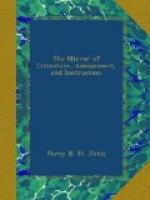In those vacant intervals of industry vulgarly entitled “holidays,” indolence which characterizes the present period, was left to the aged or infirm. The writer whom we have before quoted says “The youths are exercised in the summer holidays in leaping, dancing, wrestling, casting the hammer, the stone, and in practising their shields; and in winter holidays the boars prepared for brawn are set to fight, or else in bull and bear baiting.” Such we see were the pursuits to which our forefathers devoted their leisure time in or about the year 1130. Their immediate descendants breathed the same spirit. In 1222 certain masters, or professors as we should call them, made a public profession of their instruction and discipline, which they imparted to those who were desirous of making themselves perfect in the above honourable achievements, which we think they were, in spite of these enlightened times, or of the slow “march of intellect.”
But of all the manly pastimes our ancestors delighted to honour, archery appears to have gained the greatest sway over the hearts of the multitude. It is stated that through the introduction of several “pernicious games,” it had for a long time been disused, and in the 33rd year of the reign of Henry VIII. a statute was made for its revival; it then continued till the reign of Charles I. A faint trial to revive it has again been attempted, but we doubt its success.
James I., at the beginning of his reign, to gratify the people, published a book of sports, of which the women had some time before participated on Sunday evenings, but which had been prohibited. These sports consisted of dancing, ringing, wrestling, and other profanations of that day, and which had risen to such a height that the land would have been deluged with immorality, if Charles I. had not wisely shown his piety, by totally abolishing them; this he did as soon as he came to his throne. In this reign may be said to have ended all those games that taught Britons to defend their altars and their homes, and unhappily nothing has been since instituted to compensate for their loss. E.J.K.
* * * * *
ORIGIN OF THE ARTILLERY COMPANY.
Stowe tells us—“About the year 1585, certain gallant, active, and forward citizens, having had experience abroad and at home, voluntarily exercised themselves, and trayned uppe others, for the readie use of warre, so as within two years, there was almost three hundredth marchants, and others of like quality, very sufficient and skillful to traine and teache common souldiers, the managing of their peeces, pikes, and holberds, to march countermarch, and ring; which said marchants, for their owne perfection in military affairs and discipline, met every Tuesday in the year, practising all usual points of warre, and every man by turn bare orderly office, from the Corporall to the Captain: some of them in the yeare 1588 had charge of men in the great Campo at Tilbury, and were generally called Captaines of the Artillery Garden.”




